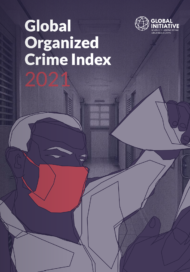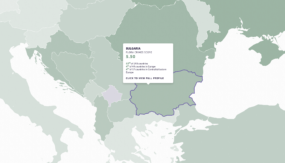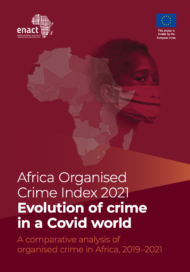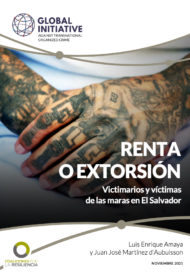Latin America is widely known to be home to some of the most powerful criminal organizations in the world, but the region’s criminal ecosystem is dominated by state-embedded actors, many of whom protect and profit from illicit economies.
When former Honduran President Juan Orlando Hernández’s name came up in the March 2021 US trial of notorious drug trafficker Geovanny Fuentes, few were surprised. The prosecutor described the Central American country as a ‘narco-state’, explaining how cartels had infiltrated ‘police, military and political power’. Their influence extended to ‘mayors, congressmen, military generals and police chiefs, even the current president’.
The same month also saw the sentencing (to life in prison) of Hernández’s brother (and former congressman), Antonio ‘Tony’ Hernández on drug trafficking charges. Hernández was found guilty of aiding the smuggling of 185 tonnes of cocaine from Colombia into the US, sometimes in collaboration with Joaquín ‘El Chapo’ Guzmán’s Sinaloa Cartel.
While the former Honduran president continues to deny any wrongdoing, he now faces the prospect of potential extradition to the US after his party lost the November 2021 general election, stripping Hernández of the immunity from prosecution he enjoyed as president.
The jury is still out as to whether he will ever be extradited, but the fact that a president was linked to drug trafficking in a US court could be a tipping point in the way countries fight state-embedded crime and the lengths they are prepared to go to.
A story of state and crime
During the Fuentes trial, US prosecutors argued that, in Honduras, the distinction between state institutions and criminal organizations is, at best, hazy and, at worse, non-existent. Analysts monitoring political and criminal dynamics in the Central American country say the links between crime organizations and political elites run deep, with many high-ranking public servants protecting (and profiting from) illicit economies.
The story of state involvement in criminality is a familiar one in this region. Although Latin America is home to some of the most powerful transnational crime organizations in the world, it is state actors who actually dominate the criminal landscape – a finding highlighted by the Global Initiative Against Transnational Organized Crime (GI-TOC)’s Global Organized Crime Index 2021. State actors facilitate illicit markets not only by protecting them and turning a blind eye, but also by rejecting measures that, if effectively implemented, could strengthen their country’s capacity to fight organized crime. These include robust accountability mechanisms, crime prevention and victim support programmes, and good governance.
Examples of Latin American state actors fuelling or enabling illicit activity are legion, from endemic low-level corruption (such as police officers facilitating drug trafficking in Argentina) to the high-level regional graft uncovered in the Odebrecht scandal. Across the region, the illegal trade in flora and fauna is rising, often aided by corrupt officials. In Brazil, for example, authorities issued fewer fines in 2020, even though deforestation soared to a 12-year high. In Venezuela – ranked among the highest countries for criminality and lowest for resilience in the Organized Crime Index – both low- and high-ranking public officials have been accused of direct involvement in crimes, including contraband, cocaine smuggling, money laundering, illegal exploitation of natural resources, exchange rate manipulation and a catalogue of human rights violations. Like Honduras’s Hernández, the Venezuelan president, Nicolás Maduro, has also been accused of aiding drug trafficking.
The scale of corruption and state involvement in crime has led some to label Venezuela a ‘mafia state’. Ronna Risquez, an investigative journalist, assessed the current situation as the result of the dismantling of democratic institutions: ‘In Venezuela,’ she said, ‘it is no longer possible to tell state and government apart.’ This, in turn, has created an environment of impunity in which criminal organizations can flourish, with investigations into corruption and crime nearly non-existent.
An intractable problem, yet reason for hope
There is broad agreement that to tackle organized crime effectively, more effort must be made to dismantle the connection between state and crime, but achieving this will require overcoming a number of steep challenges. Firstly, criminal connections with the state are becoming increasingly entrenched and difficult to undo. In the most serious instances, where organized crime actors capture control of the state apparatus, the ability of law enforcement and justice institutions to hold criminals to account is critically undermined (as is the case in Venezuela).
Secondly, but closely linked, the political will to dismantle these connections is still largely lacking in many parts of the region. Indeed, political actors have often been antipathic to such initiatives, and ground-breaking attempts to tackle impunity and corruption across Central America have been shut down as soon as they became too uncomfortable for those in power. Despite their many achievements, initiatives such as the International Commission against Impunity in Guatemala and the Mission to Support the Fight against Corruption in Honduras have faced hostility from some government actors and were not given the opportunity to complete their work. This antagonism towards those engaged in fighting corruption and impunity and combating organized crime is most starkly illustrated by the huge numbers of assassinations of civil society actors. Latin America is the most dangerous region in the world for human rights activists, with dozens killed in 2019 and 2020.
There is still some reason for hope, however. Latin America is host to hundreds of thousands of civil society organizations, journalists, lawyers and activists fighting to turn the tables on crime, violence and elite corruption. Their collective efforts have been identified as one of the most important sources of resilience against illicit economies: South America scores higher than the global average of 4.88 in the Organized Crime Index’s ‘non-state actor’ resilience indicator, with a regional score of 5.96. Central American countries such as Mexico, Guatemala, Costa Rica and Panama also rank higher than the global average in the same indicator. These civil society groups need to be supported, protected and encouraged, particularly when no one else is shining a light on the abuse of power by the region’s political elites. Their determination and tenacity in the face of extreme danger make such activists the region’s brightest hope and best chance of a future less plagued by crime.
But they cannot do it alone. Bringing state actors suspected of involvement in organized crime to justice is a powerful way of sending a strong message to others that these types of crimes will not go unpunished. While the future of the Hernández case is hard to predict, it may well become a game changer.
This analysis is part of the GI-TOC’s series of articles delving into the results of the Global Organized Crime Index 2021. The series explores the Index’s findings and their effects on policymaking, anti-organized crime measures and analyses from a thematic or regional perspective.
Subscribe to the GI-TOC Global Organized Crime Index newsletter to get regular updates about the project.
En Latinoamérica residen algunas de las organizaciones criminales más poderosas del mundo. Sin embargo, el ecosistema delictivo de la región está dominado por actores integrados en el Estado, muchos de los cuales protegen y se benefician de economías ilícitas.
Cuando el nombre del expresidente hondureño Juan Orlando Hernández fue mencionado en el juicio contra el notorio narcotraficante Geovanny Fuentes, en marzo del 2021 en Estados Unidos, pocos se sorprendieron. El fiscal describió a la nación centroamericana como un «narco-Estado», explicando la forma en que los carteles habían infiltrado el «poder policial, militar y político». Su influencia había llegado a «mayores, congresistas, generales militares y jefes de policía, incluso al mismo presidente».
Ese mismo mes habían sentenciado (a cadena perpetua) al hermano de Hernández, el excongresista Antonio «Tony» Hernández, por narcotráfico. Hernández fue encontrado culpable de facilitar el contrabando de 185 toneladas de cocaína de Colombia a Estados Unidos, algunas veces en colaboración con el cartel de Sinaloa de Joaquín «El Chapo» Guzmán.
Mientras que el expresidente hondureño continúa negando cualquier delito, se enfrenta a una posible extradición a Estados Unidos después de que su partido perdiera las elecciones generales en noviembre del 2021, despojándolo de la inmunidad judicial de la que gozaba como presidente.
El jurado aún está deliberando si será extraditado, pero el simple hecho de que un presidente haya sido vinculado al tráfico de drogas en una corte estadounidense podría marcar un antes y un después en la forma en que los países luchan contra el crimen integrado al Estado y muestra hasta dónde están dispuestos a llegar.
Una historia de gobierno y crimen
Durante el juicio de Fuentes, la fiscalía de Estados Unidos argumentaba que en Honduras la línea que separa a las instituciones del Estado de las organizaciones criminales es, en el mejor de los casos, difusa por no decir que inexistente. Analistas que monitorean las dinámicas criminales en el país centroamericano señalan que los vínculos entre las organizaciones criminales y las élites políticas son profundos y que muchos servidores públicos de alto nivel protegen a las economías ilícitas y se benefician de ellas.
La historia de la participación del Estado en la delincuencia es común en la región. Si bien en Latinoamérica residen algunas de las organizaciones criminales transnacionales más poderosas del mundo, son los actores integrados en el Estado los que realmente dominan el panorama criminal, un hallazgo que se destaca en el Índice global de crimen organizado 2021 de The Global Initiative Against Transnational Organized Crime (la Iniciativa global contra el crimen organizado transnacional, GI-TOC). Los actores integrados en el Estado facilitan los mercados ilícitos al protegerlos y hacer la vista gorda, pero también al impedir medidas que de implementarse de forma efectiva podrían fortalecer la capacidad del país de hacer frente al crimen organizado. Esto incluye mecanismos robustos de rendición de cuentas, programas de prevención del delito y atención a víctimas, y buen gobierno.
Los ejemplos de actores integrados al Estado que alimentan o facilitan actividades ilícitas son numerosos en Latinoamérica, desde corrupción sistemática de bajo perfil (como oficiales de policía en Argentina que facilitan el tráfico de drogas) hasta los actos de corrupción regionales del más alto nivel sacados a la luz con el escándalo Odebrecht. A lo largo y ancho de la región, el comercio ilegal de flora y fauna va en aumento, a menudo con el apoyo de funcionarios corruptos. En Brasil, por ejemplo, las autoridades impusieron menos multas en 2020 a pesar de que la deforestación tuvo sus niveles más altos en 12 años. En Venezuela, país que se encuentra entre aquellos evaluados con mayor criminalidad y menor resiliencia en el Índice de crimen organizado, funcionarios públicos de todos los niveles han sido acusados de participar directamente en actividades criminales como contrabando, tráfico de cocaína, lavado de dinero, explotación ilegal de recursos naturales, manipulación del tipo de cambio y violaciones de los derechos humanos. Así como el hondureño Hernández, el presidente venezolano Nicolás Maduro también ha sido acusado de facilitar el tráfico de drogas.
La magnitud de la corrupción y el nivel de participación del Estado en actividades criminales ha llevado a algunos a calificar a Venezuela como «Estado mafioso». La periodista de investigación Ronna Rísquez diagnosticó la situación actual como el resultado del desmantelamiento de las instituciones democráticas: «En Venezuela es imposible diferenciar entre Estado y Gobierno», dijo. Esto, a su vez, ha creado un ambiente de impunidad en el que las organizaciones criminales pueden prosperar y donde las investigaciones por corrupción y crimen prácticamente no existen.
Un problema difícil de resolver, pero hay esperanza
Existe un amplio consenso de que para hacer frente a la delincuencia de forma efectiva se deben enfocar esfuerzos en el desmantelamiento de los vínculos entre el Estado y la delincuencia, pero para lograrlo se requiere superar desafíos complejos. En primer lugar, las conexiones entre la delincuencia y el Estado están cada vez más arraigadas y son más difíciles de deshacer. En los casos más serios, en los que los actores criminales tienen el control del aparato del Estado, la capacidad de las instituciones policiales y judiciales para hacer rendir cuentas a los criminales se debilita a niveles críticos (como en el caso de Venezuela).
En segundo lugar, pero estrechamente ligada, está la falta de voluntad política para desmantelar estas conexiones en muchas partes de la región. De hecho, con frecuencia los actores políticos se muestran reacios a este tipo de iniciativas, e intentos innovadores por hacer frente a la impunidad y la corrupción a lo largo de Centroamérica han sido bloqueados al convertirse en un problema para los que están en el poder. A pesar de sus innumerables logros, iniciativas como la Comisión Internacional contra la Impunidad en Guatemala y la Misión de Apoyo contra la Corrupción y la Impunidad en Honduras han sufrido hostilidades por parte de actores estatales y no se les ha brindado la oportunidad de completar su trabajo. Este antagonismo en contra de quienes están comprometidos con la lucha contra la corrupción y la impunidad y que combaten al crimen organizado está claramente ilustrado en el alto número de asesinatos registrados en contra de actores de la sociedad civil. Latinoamérica es la región más peligrosa en el mundo para los activistas de los derechos humanos y decenas fueron asesinados entre 2019 y 2020.
Sin embargo, hay razones para tener esperanza. Latinoamérica alberga a cientos de miles de organizaciones de la sociedad civil, periodistas, abogados y activistas que están luchando para revertir el crimen, la violencia y la corrupción de las élites. Sus esfuerzos colectivos han sido identificados como una de las principales fuentes de resiliencia frente a las economías ilícitas: Sudamérica tiene un puntaje por encima del promedio global de 4.88 en el indicador de resiliencia «actores no estatales» del Índice global del crimen organizado, con un 5.96 de puntuación regional. Países centroamericanos como México, Guatemala, Costa Rica y Panamá también presentan calificaciones más altas que el promedio global para el mismo indicador. Estos grupos de la sociedad civil necesitan ser apoyados, protegidos y motivados, particularmente cuando nadie más está sacando a la luz los abusos de poder de las élites políticas de la región. La determinación y tenacidad que estos actores muestran frente al peligro extremo los convierte en la más brillante esperanza y la mejor oportunidad de tener un futuro menos plagado por el crimen.
Pero no pueden hacerlo solos. Llevar ante la justicia a los actores integrados en el Estado sospechosos de estar involucrados con el crimen organizado es una poderosa forma de mandar el contundente mensaje de que este tipo de crímenes no serán impunes. Si bien el futuro del caso Hernández es difícil de predecir, podría cambiar las reglas del juego.
Este análisis es parte de una serie de artículos de GI-TOC que profundizan en los resultados del Índice global de crimen organizado 2021. Esta serie explora los hallazgos del Índice y sus efectos en el desarrollo de políticas públicas, en las medidas contra el crimen organizado y aporta análisis desde una perspectiva temática o regional.
Suscríbete al boletín del Índice de crimen organizado de GI-TOC para recibir actualizaciones sobre el proyecto.



